From the Archives Paris in the 1950's
Nov 18, 2022 16:07:46 #
HamBar06
Loc: Philadelphia, PA
Since everybody is familiar with Paris, it seems pointless to give you much history or customs information. Instead here are a few tidbits; some of which I guess you already know.
Paris’ original name was Lutetia. Paris was founded by the Romans, in the 3rd century BC. In Latin, Lutetia means “place near a swamp”. the name change was Paris, from the Parisii, a Celtic community that used to live on the banks of the River Seine. The city became the French capital in 508.
Paris is referred to as the city of light. What most people don’t know is how it assumed this nickname. It is called the city of light because it was one of the first European cities to install street lights; commissioned by Louis XIV in the 17th century to put more light on the streets as a way of restoring the city’s safety.
Paris is not the largest French-speaking city in the World. That title belongs to Kinshasa, the capital city of the Democratic Republic of Congo.
The Pont Neuf [ New Bridge] is the oldest bridge in Paris.
There is a vineyard in Montmartre. Montmartre is an excellent example. an independent town and has unique country feel! The Clos Montmartre vineyard is the only vineyard left in Paris. It was created in 1933 by the city of Paris and the city still owns it. The bottles are quite pricey but that doesn’t mean it’s a good wine. It is not a particularly good wine, but it is the only wine produced in Paris.
There is only one STOP sign in the whole city. You can spend all day on Google Street View if you want, but you will only find that one! It’s located in the 16th arrondissement, along the River Seine. However there are other rules. Traffic in Paris is controlled by either traffic lights or “Priorité à droite”, which is the rule saying that you have to give way to cars on your right.
The Musée d’Orsay used to be a train station. This train station was the Gare d’Orsay. on the Left Bank of the Seine. a Beaux-Arts railway station built between 1898 and 1900. The new museum was inaugurated in 1986 after President Valery Giscard authorized renovations, overseen by the French architectural firm Philippon, Colboc, and Bardon, and Italian architect Gae Aulenti. . It is one of the largest art museums in Europe. The museum holds mainly French art dating from 1848 to 1914, including paintings, sculptures, furniture, and photography.
The Eiffel Tower was built to celebrate the 100-year anniversary of the French Revolution in 1900 . The Eiffel Tower is the most famous landmark in Paris but was intended to be dismantled after the celebration. There are 1,665 steps from the base to the Top of the Eiffel tower. You don’t have to climb all of them since the stairs from the second to the third floor are not open to the public.
Paris metro is the second oldest underground system in the world. Paris metro was opened in 1900, right after London Tube. Over 6 million Parisians use it! As a matter of fact, it is said that every building in Paris is within 500m of a metro station.
Paris metro has several ghost stations. Most of them were closed during WWII and are not used in any kind of ways now. Two stations were built but ended up never opening. Some were opened and then closed.
.In French slang, policemen are called “chickens”, or Les Poulets in french, It’s not only used in Paris, but common everywhere in the country. Its origins are in Paris.
The French Army still uses carrier pigeons and is the only army in Europe that still using pigeons trained to carry messages.
Tree counting is an official job in Paris. The current official standing is at 484,000 trees with more to be planted in the coming years! This makes Paris one of the most treed cities in Europe
The Louvre art museum is the largest art museum in the world. Located in the center of Paris, it’s part of a historic estate known as the Louvre Palace. It is the world’s most popular museum and has the biggest collection on the planet.
The Sacré-Coeur Basilica, also known as the Basilica of the Sacred Heart, is blessed with its location in Paris. At the top of a huge hill in Montmartre overlooking the city, large steps cascade down the hill on one side, and the basilica's white domes loom up behind them. This Catholic cathedral was built in 1876.
Notre-Dame de Paris ("Our Lady of Paris"), is a medieval Catholic cathedral on the Île de la Cité , in the 4th arrondissement of Paris. It is dedicated to the Virgin Mary and is considered one of the finest examples of French Gothic architecture. Construction of the cathedral began in 1163 under Bishop Maurice de Sully and was largely completed by 1260, though it was modified frequently in the centuries that followed. On 15 April 2019, while Notre-Dame was undergoing renovation and restoration, its roof caught fire and burned for about 15 hours. The cathedral sustained serious damage as a result.
The Avenue des Champs-Élysées is an avenue in the 8th arrondissement of Paris, 1.2 miles long and 230 feet wide, running between the Place de la Concorde in the east and the Place Charles de Gaulle in the west, where the Arc de Triomphe is located.. The name is French for the Elysian Fields, the place for dead heroes in Greek mythology. It ends at the Arc de Triomphe, built to honour the victories of Napoléon Bonaparte. The Champs-Elysees called the most beautiful Avenue in the world.
Montmartre is a large hill in Paris's northern 18th arrondissement. It gives its name to the surrounding district, part of the Right Bank. Primarily known for its artistic history, and as as a nightclub district
During the Belle Époque, many artists lived, worked, or had studios in or around Montmartre, Downhill to the southwest is the red-light district of Pigalle. That area is, today, largely known for a wide variety of stores.
The Arc de Triomphe de l'Étoile ( 'Triumphal Arch of the Star'), designed by Jean Chalgrin in 1806; is one of the most famous monuments in Paris, France, standing at the western end of the Champs-Élysées at the centre of Place Charles de Gaulle, at the juncture formed by its twelve radiating avenues.
Moulin Rouge ('"Red Mill"') is a cabaret in Paris on Boulevard de Clichy, at Place Blanche. In 1889,it was co-founded by Charles Zidler and Joseph Oller,. The original venue was destroyed by fire in 1915. A red windmill is located on its roof. Moulin Rouge is best known as the birthplace of the modern form of the can-can dance. Originally introduced as a seductive dance by the courtesans who operated from the site,
Paris’ original name was Lutetia. Paris was founded by the Romans, in the 3rd century BC. In Latin, Lutetia means “place near a swamp”. the name change was Paris, from the Parisii, a Celtic community that used to live on the banks of the River Seine. The city became the French capital in 508.
Paris is referred to as the city of light. What most people don’t know is how it assumed this nickname. It is called the city of light because it was one of the first European cities to install street lights; commissioned by Louis XIV in the 17th century to put more light on the streets as a way of restoring the city’s safety.
Paris is not the largest French-speaking city in the World. That title belongs to Kinshasa, the capital city of the Democratic Republic of Congo.
The Pont Neuf [ New Bridge] is the oldest bridge in Paris.
There is a vineyard in Montmartre. Montmartre is an excellent example. an independent town and has unique country feel! The Clos Montmartre vineyard is the only vineyard left in Paris. It was created in 1933 by the city of Paris and the city still owns it. The bottles are quite pricey but that doesn’t mean it’s a good wine. It is not a particularly good wine, but it is the only wine produced in Paris.
There is only one STOP sign in the whole city. You can spend all day on Google Street View if you want, but you will only find that one! It’s located in the 16th arrondissement, along the River Seine. However there are other rules. Traffic in Paris is controlled by either traffic lights or “Priorité à droite”, which is the rule saying that you have to give way to cars on your right.
The Musée d’Orsay used to be a train station. This train station was the Gare d’Orsay. on the Left Bank of the Seine. a Beaux-Arts railway station built between 1898 and 1900. The new museum was inaugurated in 1986 after President Valery Giscard authorized renovations, overseen by the French architectural firm Philippon, Colboc, and Bardon, and Italian architect Gae Aulenti. . It is one of the largest art museums in Europe. The museum holds mainly French art dating from 1848 to 1914, including paintings, sculptures, furniture, and photography.
The Eiffel Tower was built to celebrate the 100-year anniversary of the French Revolution in 1900 . The Eiffel Tower is the most famous landmark in Paris but was intended to be dismantled after the celebration. There are 1,665 steps from the base to the Top of the Eiffel tower. You don’t have to climb all of them since the stairs from the second to the third floor are not open to the public.
Paris metro is the second oldest underground system in the world. Paris metro was opened in 1900, right after London Tube. Over 6 million Parisians use it! As a matter of fact, it is said that every building in Paris is within 500m of a metro station.
Paris metro has several ghost stations. Most of them were closed during WWII and are not used in any kind of ways now. Two stations were built but ended up never opening. Some were opened and then closed.
.In French slang, policemen are called “chickens”, or Les Poulets in french, It’s not only used in Paris, but common everywhere in the country. Its origins are in Paris.
The French Army still uses carrier pigeons and is the only army in Europe that still using pigeons trained to carry messages.
Tree counting is an official job in Paris. The current official standing is at 484,000 trees with more to be planted in the coming years! This makes Paris one of the most treed cities in Europe
The Louvre art museum is the largest art museum in the world. Located in the center of Paris, it’s part of a historic estate known as the Louvre Palace. It is the world’s most popular museum and has the biggest collection on the planet.
The Sacré-Coeur Basilica, also known as the Basilica of the Sacred Heart, is blessed with its location in Paris. At the top of a huge hill in Montmartre overlooking the city, large steps cascade down the hill on one side, and the basilica's white domes loom up behind them. This Catholic cathedral was built in 1876.
Notre-Dame de Paris ("Our Lady of Paris"), is a medieval Catholic cathedral on the Île de la Cité , in the 4th arrondissement of Paris. It is dedicated to the Virgin Mary and is considered one of the finest examples of French Gothic architecture. Construction of the cathedral began in 1163 under Bishop Maurice de Sully and was largely completed by 1260, though it was modified frequently in the centuries that followed. On 15 April 2019, while Notre-Dame was undergoing renovation and restoration, its roof caught fire and burned for about 15 hours. The cathedral sustained serious damage as a result.
The Avenue des Champs-Élysées is an avenue in the 8th arrondissement of Paris, 1.2 miles long and 230 feet wide, running between the Place de la Concorde in the east and the Place Charles de Gaulle in the west, where the Arc de Triomphe is located.. The name is French for the Elysian Fields, the place for dead heroes in Greek mythology. It ends at the Arc de Triomphe, built to honour the victories of Napoléon Bonaparte. The Champs-Elysees called the most beautiful Avenue in the world.
Montmartre is a large hill in Paris's northern 18th arrondissement. It gives its name to the surrounding district, part of the Right Bank. Primarily known for its artistic history, and as as a nightclub district
During the Belle Époque, many artists lived, worked, or had studios in or around Montmartre, Downhill to the southwest is the red-light district of Pigalle. That area is, today, largely known for a wide variety of stores.
The Arc de Triomphe de l'Étoile ( 'Triumphal Arch of the Star'), designed by Jean Chalgrin in 1806; is one of the most famous monuments in Paris, France, standing at the western end of the Champs-Élysées at the centre of Place Charles de Gaulle, at the juncture formed by its twelve radiating avenues.
Moulin Rouge ('"Red Mill"') is a cabaret in Paris on Boulevard de Clichy, at Place Blanche. In 1889,it was co-founded by Charles Zidler and Joseph Oller,. The original venue was destroyed by fire in 1915. A red windmill is located on its roof. Moulin Rouge is best known as the birthplace of the modern form of the can-can dance. Originally introduced as a seductive dance by the courtesans who operated from the site,
1964 Eiffel Tower - new paint job in Progress. Sad Note: while on tower, one painter fell to his death.
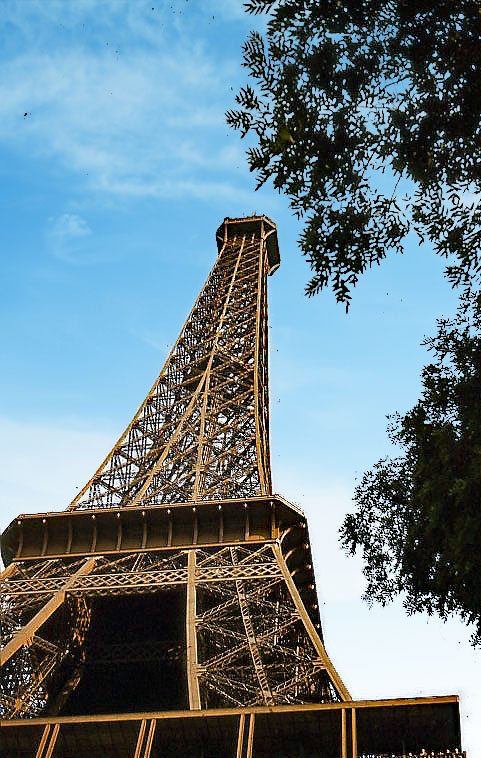
1954 Eiffel Tower - plaza under structure.
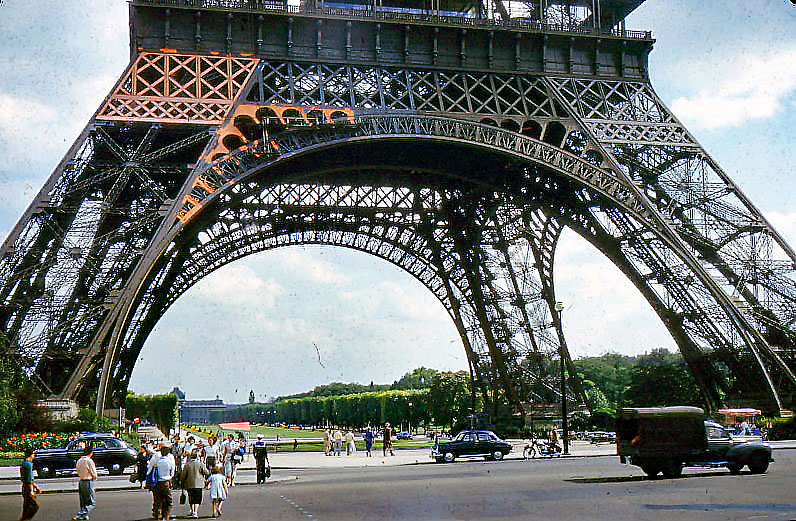
Eiffel Tower - View to ground from top of tower.
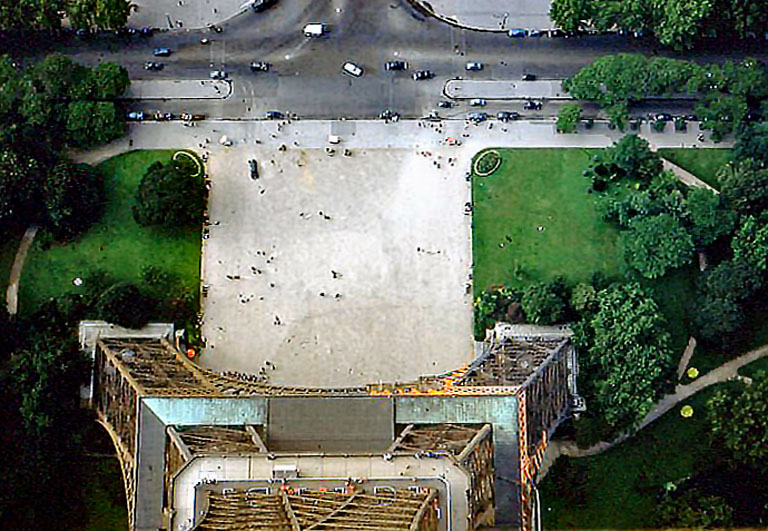
1954 Basilica of the Sacred Heart.
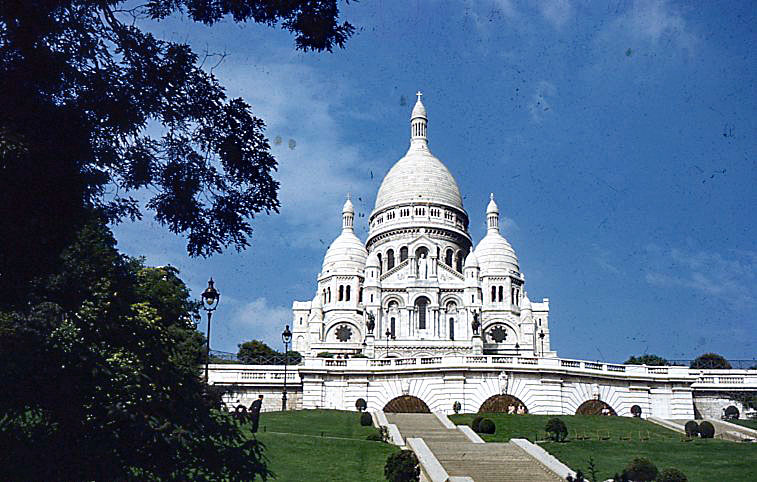
1954 Champs Elllysees from top of tower.
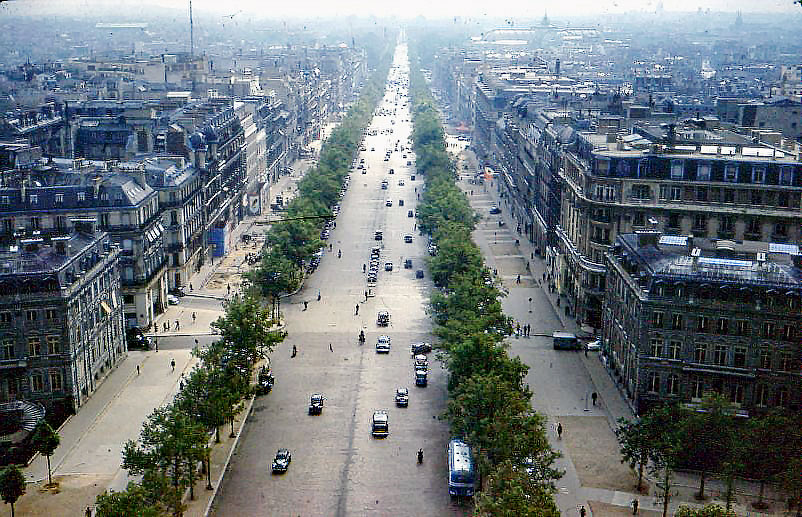
1954 City of Paris view from top of Tower.
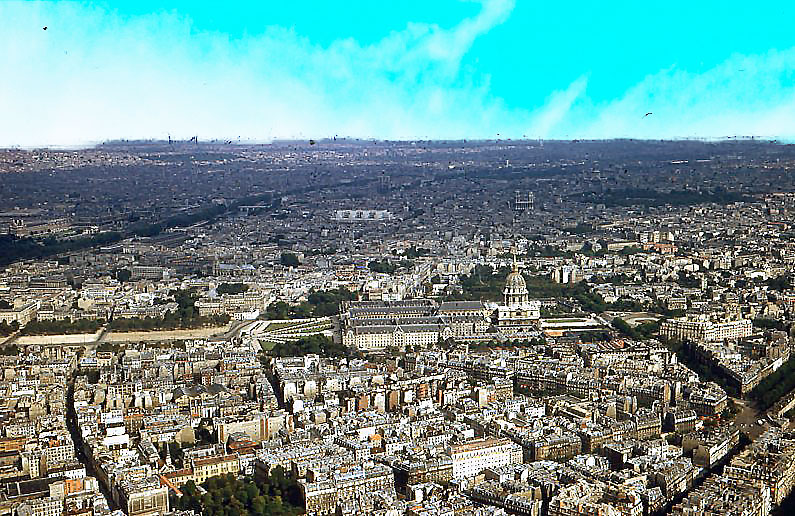
1954 Notre Dame Cathedral - pre-cleaning and pre- fire.
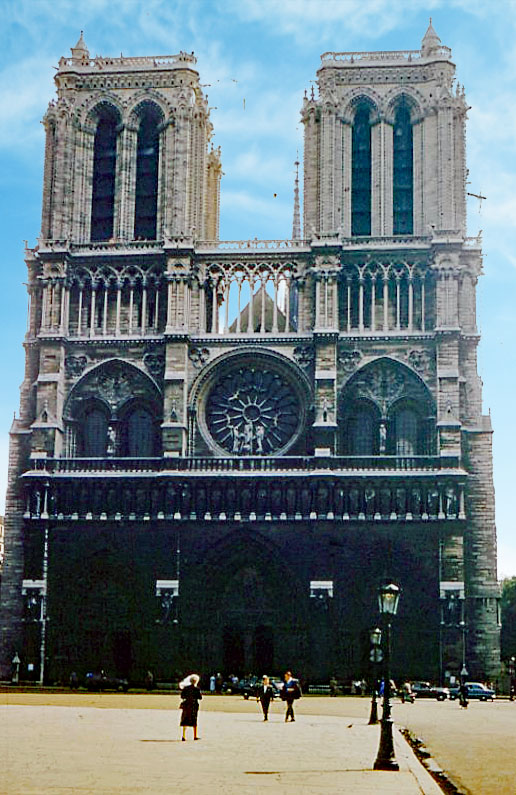
1954 Notre Dame Cathedral - Gargoyles on alert.
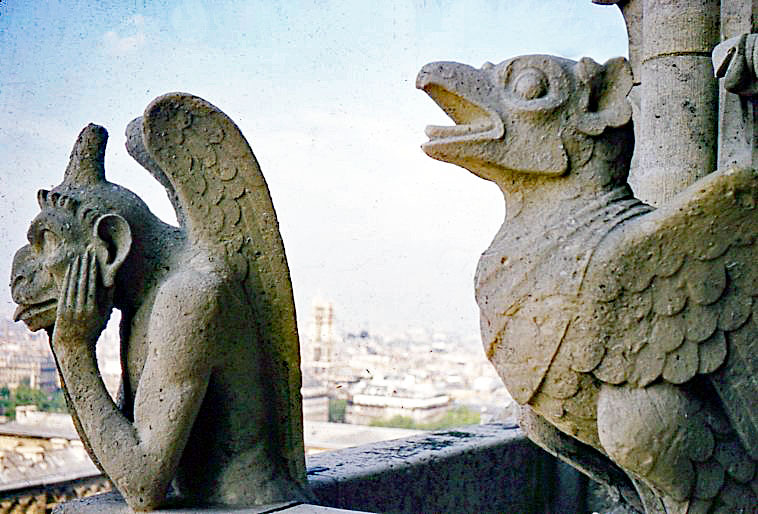
1955 Champs Elllysees view to Arch of Triumph.
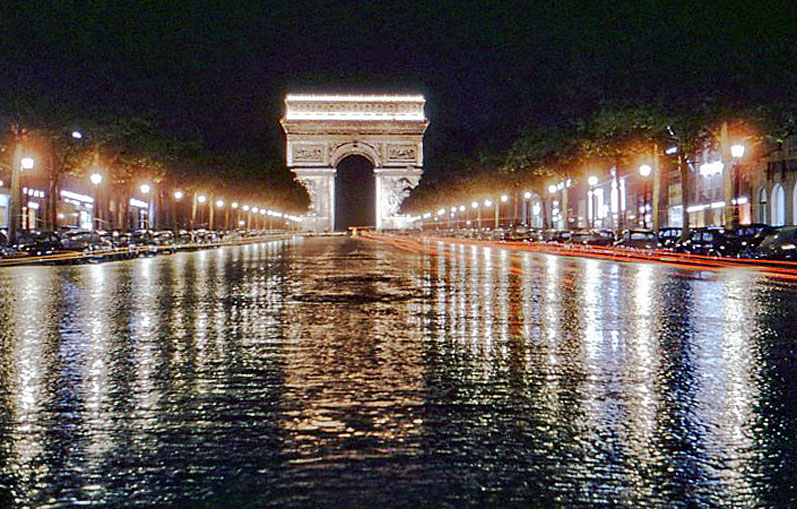
1955 Pigalle - Moulin Rouge.
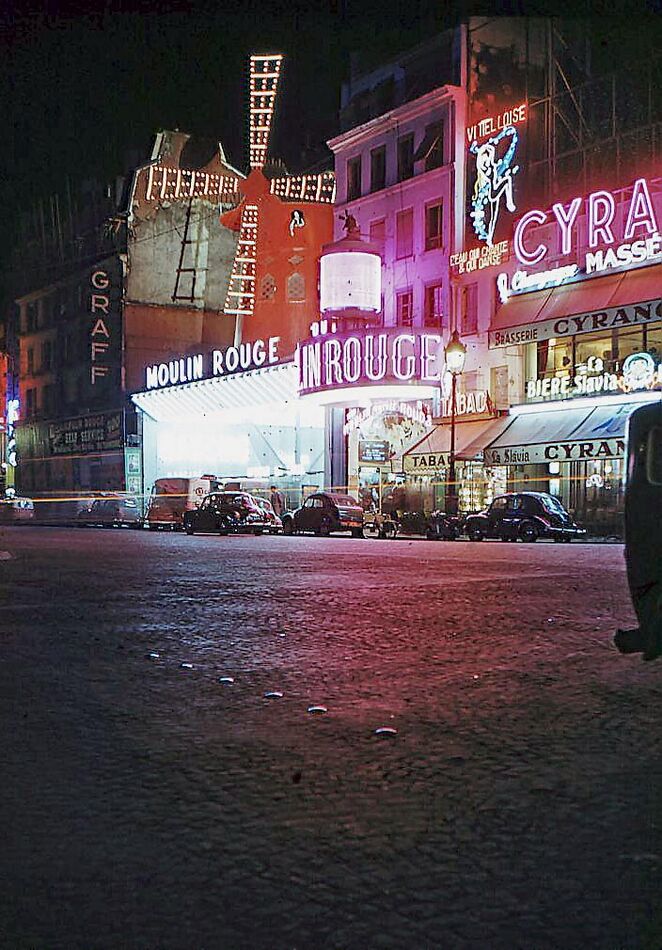
(Download)
Nov 18, 2022 16:09:39 #
Nov 18, 2022 16:47:57 #
Nov 18, 2022 16:53:04 #
HamBar06 wrote:
Since everybody is familiar with Paris, it seems p... (show quote)
Stunningly beautiful, perfectly captured views of the City of Lights 🥇🥇🏆🥇🥇
Nov 18, 2022 16:59:50 #
HamBar06
Loc: Philadelphia, PA
Flying Three wrote:
Good info. Enjoyed your vintage photographs. . . .
Thanks for looking and favorable comments.
Larry B.

Nov 18, 2022 17:02:30 #
HamBar06
Loc: Philadelphia, PA
Longshadow wrote:

Longshadow,
Thanks for the thumbs-up. Thanks for looking/
Larry B.

Nov 18, 2022 18:06:31 #
Nov 18, 2022 21:36:52 #
HamBar06
Loc: Philadelphia, PA
NMGal wrote:
Great series and information.
Happy you liked the post. Thanks for your feedback.
Larry B.

Nov 18, 2022 21:38:44 #
HamBar06
Loc: Philadelphia, PA
joecichjr wrote:
Stunningly beautiful, perfectly captured views of the City of Lights 🥇🥇🏆🥇🥇
Joe,
Thank you very much. Glad you enjoyed the photos.
Larry B.

Nov 18, 2022 21:40:38 #
HamBar06
Loc: Philadelphia, PA
Flying Three wrote:
Good info. Enjoyed your vintage photographs. . . .
Thank you very much. Glad you liked them.
Larry B.

Nov 19, 2022 06:08:33 #
Nov 19, 2022 07:02:42 #
Nov 19, 2022 07:25:51 #
Nov 19, 2022 07:33:15 #
LLC
Loc: Ontario, Canada
HamBar06 wrote:
1954 Champs Elllysees from top of tower.
You cannot get this view from the tower... I guess it is from The Arc de Triomphe...
Nov 19, 2022 08:29:51 #
If you want to reply, then register here. Registration is free and your account is created instantly, so you can post right away.






